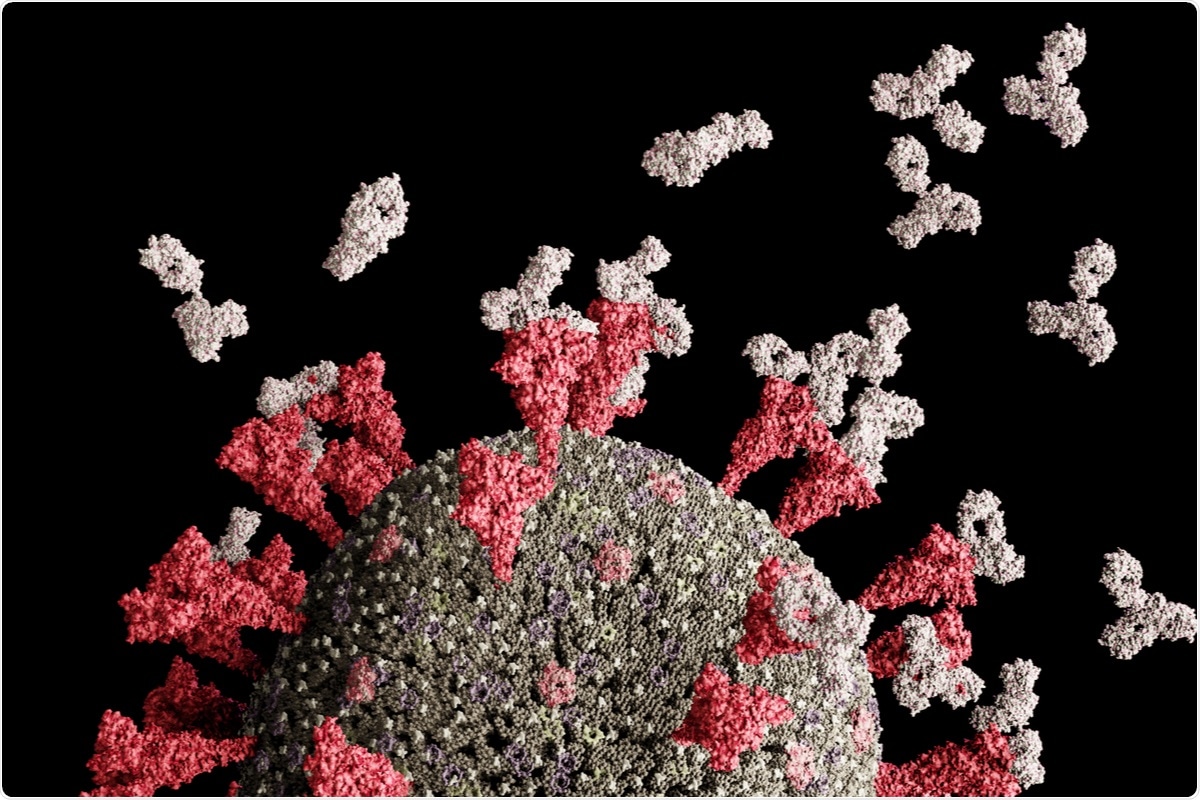A new study published in JAMA examined severe acute respiratory syndrome coronavirus 2 (SARS-CoV-2) spike immunoglobulin (Ig)G antibodies in a longitudinal cohort, comparing antibody durability in individuals who received an mRNA SARS-CoV-2 vaccine with or without prior SARS-CoV-2 infection.
 Study: Durability of Antibody Levels After Vaccination With mRNA SARS-CoV-2 Vaccine in Individuals With or Without Prior Infection. Image Credit: Leonid Altman/Shutterstock
Study: Durability of Antibody Levels After Vaccination With mRNA SARS-CoV-2 Vaccine in Individuals With or Without Prior Infection. Image Credit: Leonid Altman/Shutterstock
The study
The present study recruited a sample of 3,500 healthcare workers from the Johns Hopkins Health System in June 2020, who were followed up through September 3, 2021.
Serum samples were collected at intervals of at least 90 days. SARS-CoV-2 polymerase chain reaction (PCR) test results and vaccination dates were collected from electronic health records. A batch of a serum sample was collected at least 14 days after receiving the second dose of an mRNA SARS-CoV-2 vaccine.
Results
Of the 1,960 healthcare workers who provided serum samples after the second vaccine dose, 73 (3.7%) had evidence of a previous infection – 41 with positive PCR results ≤90 days before vaccination and 32 with positive PCR results >90 days before vaccination. Of these participants, 80% were women, 95% were Non-Hispanic/Latino, and 80% were White. The median age of participants was 40.4 (interquartile range 32.6-52.1) years.
Among participants without previous SARS-CoV-2 infection, the adjusted median antibody measurements were 8.69, one month after vaccination; 7.28 after three months; and 4.55 six months after vaccination. Moreover, participants with prior SARS-CoV-2 infection maintained higher post-vaccination adjusted median antibody measurements by an absolute difference of 1.25 one month after vaccination, 1.42 after three months, and 2.56 six months after vaccination.
Additionally, individuals with PCR-confirmed infection more than 90 days before vaccination had higher post-vaccination adjusted antibody measurements compared to those with PCR-confirmed infection less than or equal to 90 days before vaccination – of 10.52 one month after vaccination and 9.31 after three months.
Implications
The findings of this study depicted that healthcare workers with prior SARS-CoV-2 infection who received two doses of mRNA vaccine (that is, subjects who encountered three independent exposures to spike antigen) developed higher spike antibody measurements than individuals with vaccination alone.
This study demonstrated that a longer interval between infection and first vaccine dose might enhance the antibody response – which emulated the results of higher antibody titers on extended vaccine dosing intervals obtained in previous studies.
The present study had a few limitations, including defining SARS-CoV-2 infection as positive PCR test results, thus, potentially misclassifying participants with unconfirmed prior infection, the use of convenience sampling, and a small proportion of study subjects with an infection episode before vaccination. In addition, neutralization titers or reinfection were not examined in this study. Furthermore, generalizability could be limited here as most participants were females, White, and middle-aged.
Further investigation is warranted to determine if increased postvaccination antibody durability in previously infected individuals depends on the number of exposures, the interval between exposures, or the interplay between natural and vaccine-derived immunity. The role of serological testing in informing optimal timing for vaccination and the need for booster doses must also be ascertained through future studies.
- Zhong D., et al. (2021). Durability of Antibody Levels After Vaccination With mRNA SARS-CoV-2 Vaccine in Individuals With or Without Prior Infection. JAMA, doi:10.1001/jama.2021.19996. https://jamanetwork.com/journals/jama/fullarticle/2785919?guestaccesskey=d6d49995-b0f4-4849-bcb5-1a486171137a&alert=article
Posted in: Medical Science News | Medical Research News | Disease/Infection News
Tags: Antibodies, Antibody, Antigen, Coronavirus, Coronavirus Disease COVID-19, Healthcare, immunity, Immunoglobulin, Polymerase, Polymerase Chain Reaction, Respiratory, SARS, SARS-CoV-2, Severe Acute Respiratory, Severe Acute Respiratory Syndrome, Syndrome, Vaccine

Written by
Nidhi Saha
I am a medical content writer and editor. My interests lie in public health awareness and medical communication. I have worked as a clinical dentist and as a consultant research writer in an Indian medical publishing house. It is my constant endeavor is to update knowledge on newer treatment modalities relating to various medical fields. I have also aided in proofreading and publication of manuscripts in accredited medical journals. I like to sketch, read and listen to music in my leisure time.
Source: Read Full Article
